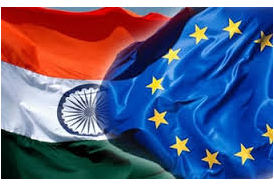
The lifesciences and biotechnology are two sectors in which India has cooperation agreements with as many as 18 EU member states
In the field of lifesciences, the Indo-European relationship is in line with European Union Delegation to India's global Research and Innovation (R&I) collaboration, notably under the Framework Programmes (FPs) of the European Commission (FP7 and others in the past, now 'Horizon 2020' for the period 2014-20), under which health has been a prominent thematic area (approximately total funding of over €6 billion under FP7).
The lifesciences and biotechnology are two sectors in which India has cooperation agreements with as many as 18 EU member states.
"Under the new Indo-European partnership on R&I which was officially agreed and developed by Indian authorities, for example, DST and DBT, along with the European Commission and several EU member states, three key themes were identified including, health, water and energy," says Dr Denis Dambois, head, research and innovation, Delegation of the European Union to India.
"Out of the three, 'health' has been considered as the most important one. Within this 'health' theme, diabetes is taken as the main sub-theme. It is a topic in which the EU is also investing serious efforts on its own," adds Dr Dambois.
India and EU Member States represent approximately 1.2 billion and 0.6 billion inhabitants respectively, whose expectations for increased quality of life and reduction of disease burdens are high.
The rising cost of healthcare is therefore an obvious common challenge. Inequality in access to health care is an additional challenge, resulting from differences in urban and rural areas, as a social factor and as a gender issue.
Dr Dambois also comments that the pattern of diseases in India is changing and approaching that of Europe, as documented by a recent report by the World Bank.
"This is particular true for the non-communicable, chronic diseases such as heart diseases, diabetes and cancer," opines Dr Dambois.
Due to demographic change, both in India and the EU, longer life expectancy, dementia and other neurodegenerative diseases will increase, leading to high costs while placing burden not only on patients but also on their families.
"Infectious diseases and the growing resistance to antibiotics should be considered together, because both India and Europe are facing comparable problems in this field," concludes Dr Dambois.
Why Europe and India should cooperate?
EU Clusters
EU biotechnology clusters and cluster organizations build an ecosystem, especially when considering that India is in the initial stage of setting up this kind of ecosystem.
There is a lot of European knowhow which would greatly benefit Indian companies at this stage.
EU clusters play a crucial role in providing interactive platforms for academia, industry, policy makers and investors to interact and collaborate in various ways like research and innovation, commercialization, creation of spin-offs and startups, funding and investment attraction, and business development opportunities.
While the largest number of life sciences employees are evidently found in the most populous regions, non-capital regions, such as Brabant Wallon (BE), Nordwestschweiz (CH) and Freiburg (DE), displaying the highest specialization in life science industries.
EuropaBio
EuropaBio is the European Association for Bioindustries and was created in 1996. Its mission is to create an innovative and dynamic biotechnology based industry in Europe.
It includes 55 corporate members, 15 associate members and bio regions, and 17 national biotechnology associations, who in turn represent more than 1800 small and medium-sized biotech companies in Europe.
Members of EuropaBio are involved in research, development, testing, manufacturing and commercialization of biotechnology products and processes.
Corporate members have a wide range of activities: human and animal health care, diagnostics, bio-informatics, chemicals, crop protection, agriculture, food and environmental products and services.




